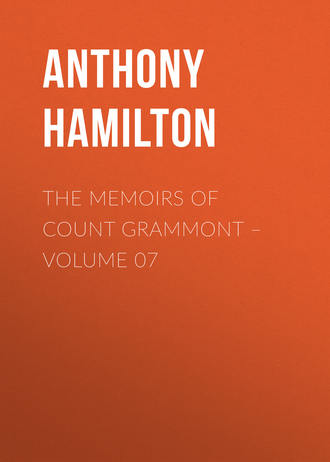
Anthony Hamilton
The Memoirs of Count Grammont – Volume 07
This continued until Lord Shrewsbury, who never before had shown the least uneasiness at his lady's misconduct, thought proper to resent this: it was public enough, indeed, but less dishonourable to her than any of her former intrigues. Poor Lord Shrewsbury, too polite a man to make any reproaches to his wife, was resolved to have redress for his injured honour: he accordingly challenged the Duke of Buckingham; and the Duke of Buckingham, as a reparation for his honour, having killed him upon the spot, remained a peaceable possessor of this famous Helen. The public was at first shocked at the transaction; but the public grows familiar with everything by habit, and by degrees both decency, and even virtue itself, are rendered tame, and overcome. The queen was at the head of those who exclaimed against so public and scandalous a crime, and against the impunity of such a wicked act. As the Duchess of Buckingham was a short fat body, like her majesty, who never had had any children, and whom her husband had abandoned for another; this sort of parallel in their situations interested the queen in her favour; but it was all in vain: no person paid any attention to them; the licentiousness of the age went on uncontrolled, though the queen endeavoured to raise up the serious part of the nation, the politicians and devotees, as enemies against it.
The fate of this princess was in many cases truly melancholy: The king, indeed, paid her every outward attention; but that was all: She easily perceived that the respect he entertained for her daily diminished, in proportion as the credit of her rivals increased: She saw that the king her husband was now totally indifferent about legitimate children, since his all-charming mistresses bore him others. As all the happiness of her life depended upon that blessing, and as she flattered herself that the king would prove kinder to her if Heaven would vouchsafe to grant her desires, she had recourse to all the celebrated secrets against sterility: pious vows, nine days' prayers, and offerings having been tried in all manners, but all to no purpose, she was at last obliged to return to natural means.
What would she have given on this occasion for the ring which Archbishop Turpin wore on his finger, and which made Charlemagne run after him, in the same manner as it had made him run after one of his concubines, from whose finger Turpin had taken it after her death! But it is now many years since the only talismans for creating love are the charms of the person beloved, and foreign enchantments have been looked upon as ineffectual. The queen's physicians, men of great prudence, sagacity, and wisdom, as they always are, having duly weighed and considered that the cold waters of Tunbridge had not succeeded in the preceding year, concluded that it would be advisable for her to try the warm baths at Bristol – [Probably Bath, D.W.] – This journey was therefore fixed for the next season; and in the confidence of its proving effectual, this excursion would have afforded her much pleasure, if the most dangerous of her rivals had not been one of the first that was appointed to attend the court. The Duchess of Cleveland being then near her time, there was no uneasiness on her account: the common rules of decency required a little attention. The public, it is true, was not either more or less acquainted with the circumstances of her situation; by the care which she now took to conceal it; but her appearing at court in her present condition would have been too great an insult to the queen. Miss Stewart, more handsome than ever, was appointed for this excursion, and began to make magnificent preparations. The poor queen durst say nothing against it; but all hopes of success immediately forsook her. What could the baths, or the feeble virtue of the waters, perform against charms that entirely counteracted their effects, either through the grief and uneasiness they occasioned her, or by their still more powerful consequences?
The Chevalier de Grammont, to whom all pleasures were insipid without the presence of Miss Hamilton, was yet unable to excuse himself from attending the court: the king delighted too much in his sprightly conversation to leave him behind; and however pleasing his company might have been in the solitude occasioned by the absence of the court, Miss Hamilton did not think it right to accept his offer of staying in town, because she was obliged to remain there: she, however, granted him the permission of writing her an account of any news that might occur upon the journey. He failed not to make use of this permission, in such a manner as one may imagine: and his own concerns took up so much space in his letters, that there was very little room left for other subjects during his stay at the baths. As absence from the object of his affections rendered this place insupportable, he engaged in everything that might dissipate his impatience, until the happy moment of return arrived.
He had a great esteem for the elder of the Hamiltons; no less esteem, and far more friendship for his brother, whom he made the confidant of his passion and attachment for his sister. The Chevalier was also acquainted with his first engagements with his cousin Wetenhall; but being ignorant of the coldness that had interrupted a commerce so brisk in its commencement, he was surprised at the eagerness he showed upon all occasions to please Miss Stewart: his assiduity appeared to the Chevalier de Grammont to exceed those civilities and attentions that are usually paid for the purpose of making court to the favourites of princes. He observed him more strictly, and soon perceived that he was deeper in love with her than was consistent either with his fortune or his repose. As soon as the remarks he made had confirmed him in his suspicions, he resolved to use his endeavours to prevent the consequences of an engagement pernicious in every respect: but he waited for a proper opportunity of speaking to him upon the subject.
In the mean time, the court enjoyed every kind of diversion, in a place where amusement is sought with avidity. The game of bowls, which in France is the pastime of mechanics and servants only, is quite the contrary in England, where it is the exercise of gentlemen, and requires both art and address: it is only in use during the fair and dry part of the season, and the places where it is practised are charming, delicious walks, called bowling-greens, which are little square grass plots, where the turf is almost as smooth and level as the cloth of a billiard-table. As soon as the heat of the day is over, all the company assemble there: they play deep; and spectators are at liberty to make what bets they please.
The Chevalier de Grammont, long before initiated in the English games and diversions, had been engaged in a horse-race, in which he was indeed unsuccessful; but he had the satisfaction of being convinced by experience, that an English horse can go twenty miles upon the high road in less than an hour. He was more fortunate at cock-fighting; and in the bets he made at the bowling-green, the party he betted upon never failed to win.
Near all these places of diversion there is usually a sort of inn, or house of entertainment, with a bower or arbour, in which are sold all sorts of English liquors, such as cider, mead, bottled beer, and Spanish wines. Here the rooks meet every evening to drink, smoke, and to try their skill upon each other, or, in other words, to endeavour to trick one another out of the winnings of the day. These rooks are, properly speaking, what we call capons or piqueurs, in France; men who always carry money about them, to enable them to lend to losing gamesters, for which they receive a gratification, which is nothing for such as play deep, as it is only two per cent., and the money to be repaid the next day.
These gentlemen are so nice in their calculations, and so particularly skilful in all manner of games, that no person would dare to enter the lists with them, were they even assured that no unfairness would be practised. Besides, they make a vow, to win four or five guineas a day, and to be satisfied with that gain; a vow which they seldom or never break.
It was in the midst of a company of these rooks, that Hamilton found the Chevalier de Grammont, when he called in one evening to get a glass of cider. They were playing at hazard; and as he who holds the dice is supposed to have the advantage, the rooks did the Chevalier de Grammont that honour out of compliment: he had the dice in his hand when Hamilton came into the room. The rooks, secure of their odds, were betting against him at a high rate, and he took all.
Hamilton could hardly believe his eyes, to see a man of his experience and knowledge engaged in so unequal a contest; but it was to no purpose that he informed him of his danger, both aloud in French, and in private by signs; he still disregarded his warnings, and the dice, that bore Caesar and his fortunes, performed a miracle in his favour. The rooks were defeated for the first time, but not without bestowing upon him all the encomiums and praises of being a very fair and honourable player, which they never fail to lavish upon those whom they wish to engage a second time; but all their commendations were lost, and their hopes deceived: the Chevalier was satisfied with the first experiment.
Hamilton, when the king was at supper, related to him how he found the Chevalier de Grammont rashly engaged with the rooks, and in what manner he had been providentially preserved. "Indeed, Sir," said the Chevalier de Grammont, "the rooks were discomfited for once;" and thereupon related the adventure to his majesty in his usual way, attracting the attention of all the company, to a circumstance trifling in itself, but rendered interesting by his humour.
After supper, Miss Stewart, in whose apartment there was play, called Hamilton to her to tell the story. The Chevalier de Grammont, perceiving that she attended to him with pleasure, was fully confirmed in the truth of his first conjectures; and, having carried Hamilton home with him to supper, they began to discourse freely together as usual, "George," said the Chevalier de Grammont, "are you in any want of money? I know you love play: perhaps it may not be so favourable to you as it is to me. We are at a great distance from London. Here are two hundred guineas: take them, I beseech you; they will do to play with at Miss Stewart's." Hamilton, who little expected this conclusion, was rather disconcerted. "How! at Miss Stewart's!" "Yes, in her apartments. Friend George," continued the Chevalier de Grammont, "I have not yet lost my eyes: you are in love with her, and, if I am not mistaken, she is not offended at it; but tell me how you could resolve to banish poor Wetenhall from your heart, and suffer yourself to be infatuated with a girl, who perhaps after all is not worth the other, and who besides, whatever favourable dispositions she may have for you, will undoubtedly in the end prove your ruin. Faith, your brother and you are two pretty fellows, in your choice. What! can you find no other beauties in all the court to fall in love with, except the king's two mistresses! As for the elder brother, I can pardon him he only took Lady Castlemaine after his master had done with her, and after Lady Chesterfield had discarded him; but, as for you, what the devil do you intend to do with a creature, on whom the king seems every day to dote with increasing fondness? Is it because that drunken sot Richmond has again come forward, and now declares himself one of her professed admirers? You will soon see what he will make by it: I have not forgotten what the king said to me upon the subject. 'Believe me, my dear friend, there is no playing tricks with our masters; I mean, there is no ogling their mistresses.' I myself wanted to play the agreeable in France with a little coquette, whom the king did not care about, and you know how dearly I paid for it. I confess she gives you fair play, but do not trust to her. All the sex feel an unspeakable satisfaction at having men in their train, whom they care not for, and to use them as their slaves of state, merely to swell their equipage. Would it not be a great deal better to pass a week or ten days incognito at Peckham, with the philosopher Wetenhall's wife, than to have it inserted in the Dutch Gazette. – We hear from Bristol, that such a one is banished the court on account of Miss Stewart, and that he is going to make a campaign in Guinea on board the fleet that is fitting out for the expedition, under the command of Prince Rupert."
Hamilton, who was the more convinced of the truth of this discourse, the more he considered it, after musing some time, appeared to wake from a dream, and addressing himself with an air of gratitude to the Chevalier de Grammont: "Of all the men in the world, my dear friend," said he, "you have the most agreeable wit, and at the same time the clearest judgment with respect to your friends: what you have told me has opened my eyes. I began to suffer myself to be seduced by the most ridiculous illusion imaginable, and to be hurried away rather by frivolous appearances than any real inclination: to you I owe the obligation of having preserved me from destruction at the very brink of a precipice. This is not the only kindness you have done me, your favours have been innumerable; and, as a proof of my gratitude for this last, I will follow your advice, and go into retirement at my cousin Wetenhall's, to eradicate from my recollection every trace of those chimeras which lately possessed my brain; but so far from going thither incognito, I will take you along with me, as soon as the court returns to London. My sister shall likewise be of the party; for it is prudent to use all precautions with a man who, with a great deal of merit, on such occasions is not over scrupulous, if we may credit your philosopher." "Do not pay any attention to that pedant," replied the Chevalier de Grammont: "but tell me what put it into your head to form a design upon that inanimate statue, Miss Stewart?" "How the devil should I know?" said Hamilton: "you are acquainted with all her childish amusements. The old Lord Carlingford was at her apartment one evening, showing her how to hold a lighted wax candle in her mouth, and the grand secret consisted in keeping the burning end there a long time without its being extinguished. I have, thank God, a pretty large mouth, and, in order to out-do her teacher, I took two candles into my mouth at the same time, and walked three times round the room without their going out. Every person present adjudged me the prize of this illustrious experiment, and Killegrew maintained that nothing but a lanthorn could stand in competition with me. Upon this she was like to die with laughing; and thus was I admitted into the familiarity of her amusements. It is impossible to deny her being one of the most charming creatures that ever was: since the court has been in the country, I have had an hundred opportunities of seeing her, which I had not before. You know that the dishabille of the bath is a great convenience for those ladies, who, strictly adhering to all the rules of decorum, are yet desirous to display all their charms and attractions. Miss Stewart is so fully acquainted with the advantages she possesses over all other women, that it is hardly possible to praise any lady at court for a well-turned arm, and a fine leg, but she is ever ready to dispute the point by demonstration; and I really believe, that, with a little address, it would not be difficult to induce her to strip naked, without ever reflecting upon what she was doing. After all, a man must be very insensible to remain unconcerned and unmoved on such happy occasions; and, besides, the good opinion we entertain of ourselves is apt to make us think a woman is smitten, as soon as she distinguishes us by habitual familiarity, which most commonly signifies nothing. This is the truth of the matter with respect to myself: my own presumption, her beauty, the brilliant station that sets it off, and a thousand kind things she had said to me, prevented me from making serious reflections; but then, as some excuse for my folly, I must likewise tell you, that the facility I found in making her the tenderest declarations by commending her, and her telling me in confidence a thousand things which she ought not to have entrusted me with, might have deceived or infatuated any other man as well as myself.







